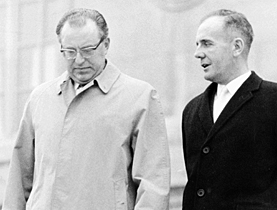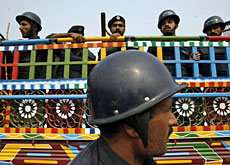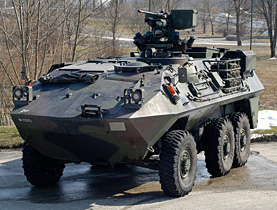Arms export vote reflects history of scandals

Oerlikon-Bührle, Pilatus, Ruag – Swiss weapons manufacturers have often made the headlines, but rarely for the right reasons.
On November 29 the Swiss will vote, for the third time since 1972, on banning the export of weapons and other military materiel. The government has recommended voters reject the initiative.
The first of many arms scandals to rock Switzerland occurred in 1968, when during the Nigerian Civil War it turned out that planes belonging to the International Committee of the Red Cross had been hit by rockets made in… Switzerland. By Zurich’s Oerlikon-Bührle to be precise.
The public were shocked by the images – after all Swiss law banned the export of arms to warring countries. But Oerlikon got round this by simply using fake export certificates. In 1970 Dieter Bührle, the company’s German president, was given a suspended sentence and a small fine.
But questions were raised over the responsibility of the government, which since 1938 had had the power to monitor arms exports. What’s more, press investigations subsequently revealed that Oerlikon-Bührle had been illegally exporting arms to apartheid South Africa as early as 1963.
In an attempt to clear the fog hanging over the government’s relations with the arms industry, pacifist groups launched an initiative to ban the export of arms. In 1972, during the Vietnam War, the initiative was narrowly rejected by 50.3 per cent of voters.
German savoir faire
In fact, the question of arms exports is nothing new in Switzerland. Between the two world wars the Swiss authorities worked hard to attract German arms manufacturers who were prevented by the 1919 Treaty of Versailles from manufacturing, importing or exporting weapons.
In 2002 the Bergier commission presented its final report on Switzerland’s activities during the Second World War. In its volume devoted to arms exports the historians concluded that “Switzerland contributed significantly less to Germany’s secret rearmament than Sweden and the Netherlands, or even the Soviet Union”.
It added however that arms manufacturers in Switzerland “had repeatedly violated the country’s law on neutrality” while at the same time making “exorbitant profits”.
While it’s true that immediately after the war Bern decided to suspend the export of arms, this stance didn’t last long and in 1949, much to the disapproval of the left and pacifists, Switzerland started exporting again.
With the Cold War in full swing, most Swiss exports headed to non-Communist countries.
“Poor man’s bombers”
This was the backdrop for the first scandal involving Pilatus, a maker of single-engine aircraft based in central Switzerland, which counted among its founders Emil Georg Bührle, father of Dieter.
In 1978 an anti-establishment magazine revealed that the company’s PC-7 training aircraft could be easily adapted to carry bombs.
“At first the government denied this,” said Jean-Marie Pellaux, author of a book on the affair. “Then, following various media revelations, it claimed this didn’t violate Swiss law as the planes hadn’t been modified in Switzerland.”
Nicknamed the “poor man’s bombers” because of their relatively modest cost, PC-7s are said to have been used by the CIA in Laos in 1962, in Myanmar, Guatemala, Mexico, Chile, Bolivia and Nigeria. More recently Pilatus products have been spotted in Iraq, South Africa and Darfur.
Continuing offences
The many scandals surrounding Pilatus have generated several parliamentary inquiries and initiatives.
But in December 2008 the House of Representatives refused to categorise Pilatus planes as war materiel and therefore didn’t ban their export to conflict zones.
Yet many recent reports indicate that such offences continue to be committed. For example in 2000 hand grenades made by state-owned arms manufacturer Ruag were sold to Britain and used in Iraq.
And then there were the tanks exported by Swiss firm Mowag to the United Arab Emirates in 2004 and Romania in 2007 and used in Morocco, Iraq and Afghanistan.
The supporters of the initiative list a hundred such scandals on their site, but they admit that the “grey zone” between the law and practice is problematic.
In the most recent vote on the issue, 12 years ago, the Swiss refused to ban the export of arms by 77.5 per cent.
Carole Wälti, swissinfo.ch (Adapted from French by Thomas Stephens)
The Swiss will vote on November 29 on a people’s initiative calling for a ban and transit of war materiel from Switzerland. More specifically it seeks to ban the export of small arms, military training aircraft and obsolete military equipment no longer used by the Swiss Armed Forces.
The ban would not apply to hunting and sport weapons, demining systems, goods temporarily exported by the Swiss authorities and those for civil protection.
The initiative also stipulates that the government provide economic support for regions affected by the ban, mainly the cantons of Nidwalden, Zurich, Thurgau, Bern and Lucerne.
The initiative was launched by the pacifist Group for a Switzerland without an Army and filed in September 2007, and has been signed by over 109,224 citizens.
In 1997 a similar initiative to ban arms exports was rejected by three out of four voters.
War materials cannot be exported to countries involved in an internal or international armed conflict, or those systematically and seriously violating human rights.
No sales are allowed to developing states that also receive development assistance or if there is a strong risk that weapons will be used against civilians or sold to another destination.
The Group for Switzerland without an Army feels that these restrictions are inadequate and do not prevent weapons that are manufactured in Switzerland from being used in countries at war.
Luc Recordon, Green party senator for canton Vaud, has come out in favour of the proposal, saying Switzerland’s role is to contribute to global disarmament efforts.
In August 2008, the cabinet recommended voters reject the people’s initiative and clarified how existing legislation, which in theory already restricts the export of weapons to certain states, would be applied.
Economics Minister Doris Leuthard warned against acceptance of the initiative, arguing that Swiss technical innovation was at stake in addition to the industry’s 5,100 jobs.
In 2008 Switzerland exported materiel worth a record SFr722 million ($695 million) to more than 70 countries.

In compliance with the JTI standards
More: SWI swissinfo.ch certified by the Journalism Trust Initiative














You can find an overview of ongoing debates with our journalists here . Please join us!
If you want to start a conversation about a topic raised in this article or want to report factual errors, email us at english@swissinfo.ch.